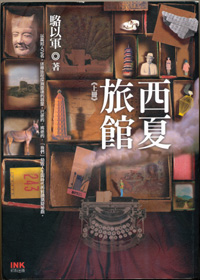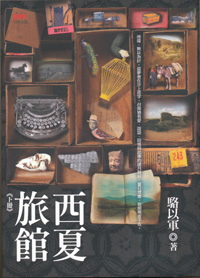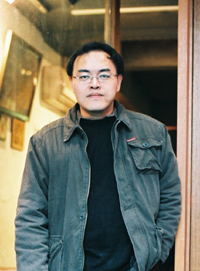The Winning novel for the Third “The Dream of Red Chamber Award”
Hotel Xixia
Taiwan: Taiwan: INK Publishing Co. (2009)
Mr. Lo Yi-chin (Taiwan)
Taiwan: Taiwan: INK Publishing Co. (2009)
Mr. Lo Yi-chin (Taiwan)
  |
Introduction to Winning Novel Hotel Xixia tells a story of trauma and redemption, diaspora and root-seeking by yoking together two sets of subjects: the mysterious disappearance of the Xixia Dynasty in the 11th century and a parade of grotesque spectacles in a decaying 'hotel'. Mixing personal confession and national narrative, magic realism and erotic fantasy, black humor and melancholy tonality, Mr. Lo depicts modern Chinese experience at its most complex and intriguing. With its dazzling language, labyrinthine structure, and kaleidoscopic imagery, Hotel Xixia represents a major breakthrough in contemporary Chinese fiction – a triumph in Mr. Lo Yi-chin's writing career. Professor Chen Sihe Chairman of the Final Judging Panel |
|
|
Biography of the Awardee Mr. Lo Yi-chin was born in Taipei in 1967. He graduated from the Creative Literary and Art Program under the Department of Chinese of Chinese Culture University and received a Master's degree from the Graduate Institute of Drama of the Taipei National University of Arts. His novels include Scarlet Letter Group, Share a Fairy Tale with a Little Star, Wife, Dream, Dog, The Third Dance, The Surname of the Moon, The Far and We. Mr. Lo has won many awards for his creative writing. These include the First Prize in Fiction of Creative Writing Award from Unitas Circuit Camp of Literature, the Fiction Award of the Taiwan College Youth Literary Award, the Taipei Literary Annual Award, being named one of the Ten Excellent Books of the Year by Asiaweek Chinese Version (2008), and the 2009 Taiwan Literary Award, just to name a few. In addition, he was also selected by Kaijuan as "Influential Figure of 2000", by the 2000 Taiwan Literature Yearbook of the Council of Cultural Affairs as "Influential Figure of 2000" and as the winner of the 2000 Taipei Literary Annual Reward. In 2004, Mr. Lo was invited by the International Writers’ Workshop of HKBU to be its Visiting Writer. In 2007, he also participated in the International Writing Program of The University of Iowa, USA. |
 |
|
|
Full text of Acceptance Speech by Lo Yi-chin at the Award Presentation Ceremony 250 years ago, a great talent wrote an unprecedented story that laid the ground for what is to become the Chinese “novel”: a freezing of time that allows insight into the dark veins of the human heart; a eulogy of beauty; a fear and lament of the destruction of an individual body; a civilization looked upon by the god of little things. A perfect universe, maze-like, that was only realized through the novel.This is The Dream of Red Chamber by Cao Xueqin. The modern novel has been forged through 100 years of the 20th century by the many novelists including Lu Xun, Shen Congwen, Eileen Chang, and later Mo Yan, Ah Cheng, Wang Anyi, Li Rui, Yu Hua, Su Tong, Han Shaogong… the works of which were unimaginable by those who came before. Through the window of the novel, these master novelists weaved dreams of madness, of fallen cities, of loss of human dignity, and of life and death. As a weaver of stories from Taiwan, I am unspeakably honoured to receive this award – an award that carried a title of power “The Dream of Red Chamber” – from the honourable panel of Judges and Professor Chung Ling, Dean of Arts Faculty of the Baptist University. In my time, we follow another “avenue of dreams” that departed from and yet run parallel to the source of all stories called “China”, because of the war, the migrations and departures over the past 100 years. Their forms changed, becoming alienated in a place estranged (my father was one of them), their memories took on fur and scales, transforming into another pregnant lair for the “distorted dream”. In Taiwan, there are such works as The Revelation of The Words of A Witch by Chu Tien-wen, Ancient City and Fleur by Chu T'ien-hsin, Sadness and Chaos and Loss by Dancing Crane, Moon Seal by Guo Sonfen. In Malaysia, there are such works as Spring and Autumn in Jiling and Sailing Up the Big River by Li Yongping, Monkey Cup by Zhang Guiqing, Marks on the Back by Huang Jinshu. In Hong Kong, Xixi was great inspiration for my generation; and Tung Kai-cheong of my generation wrote the masterpiece Works and Creations. One generation earlier, we had Hualing Nieh Engle who wrote Mulberry and Peach: Two Women of China and Li Yu who wrote The Story of Wenzhou Street… This, for me, is a pin cushion, a glamorous, southern dream of diaspora brought into being by the loss of one’s origins. It was like Hayao Miyazaki’s Spirited Away, where the parents of the protagonist were transformed into pigs, and her very name was taken away by the gods. The only salvation was to create a realm of dreams from nothingness. It also reminds me of The Enigma of Arrival by V. S. Naipaul, where the perpetual longing and sadness painted a mist-shrouded landscape whose original state was never retrievable. About Hotel Xixia, my original conception was to create a dream of a distant realm the likes of Howl's Moving Castle or the “bathhouse for the spirits” in Spirited Away: the memories of every tenant, server, manager, cleaning lady fills, changes and shapes the boundaries of the hotel. In university I read a story by John Barth Lost in the Funhouse, and I was enamored with it. It was about a family excursion, where the adults had their intrigues and minor scuffles occurred among the children. The protagonist, a young boy, fell for a girl from another family who was with them on this trip. Later, in a funhouse of a carnival, they (or it seemed only he) were sucked into an eerie time trap, and were unlikely to escape. He seemed to have been gone through to the other side of the partitions – the wiring, gadgetry, peepholes, air ducts… I had a morbidly fascination with the story, as it had seemed that the protagonist was able to hear the laughter and steps of his friends, but like the “carnival ghosts” he was forever trapped. I have an obsession about such a boundary that traps all characters. Something similar to Ingmar Bergman’s version of A Midsummer Night's Dream, where everyone is trapped in a closed theatre, and all manners of colourful poison – madness, hate, envy and hurt – get released. Such an old dream, a life-like wax house was impossible to attain for a creator like me, for simple yet old reasons: a lack of experience and education I had little understanding of the inner melancholies, profusions, darkness and humor of our indigenous elder generation; but wasn’t it also true that I had only the sketchiest impressions of the old timers from the Mainland? I had the greatest love for “hotels”. Those who dwell here are passers-by, trespassers, seeking refuge in a place where time is temporarily put on hold. I feel that the relationship between the land and hotel was one of vagueness – much in the way that I, a second-generation migrant, approached the form of the identifying subject: lacking in an asset of time. Father (or his exiled generation) created a legend of wanderers, but we hear his embellish accounts of those days in a place much like a film studio. Rituals. Philosophies. Family histories. The inaccurate rituals of worship he recited from memory. Banned aesthetics. These are all destined to be childless – if you are the appointed perpetuator of stories, then it was destined to be a childless time capsule: a one-night stand of sexless reproduction and mono-chromosomes, like the kirin, hinny, or liger. The lack of education (my identity as an outsider) has made my house of culture and time a poor imitation; it has also poked holes in my line of questioning about the source of injury: a violent insult of the culture of the other (sentiments, hidden memories, stacked shadows, stable relationships); a mistaken approach for the pain of the other (not from Hollywood films, Google search or the disquieting “love” from Kundera’s dictionary of misunderstood words)… The plague underneath the psychological avatar of my generation is not the insensitivity, the lack of empathy, the inability to understand pain, but rather something evocative of the stolen child that replaced by an ice-sculpture in Kenzaburo Oe’s The Changeling. How can one reclaim the “real” infant of the future from among the tens of thousands of fakes? My identity as an outsider gave me a broadly creative vision. The fact that however hard you work, you are denied access to an “imaginative community and its civilization”, constitutes a form of learning. I must again thank you for recognizing the novel Xixia Hotel with this honor. I truly hope that this highest honour for the Chinese novel is not just a ‘Dream of the Red Chamber’ for every single lonely novelist who struggles to create, but an ‘Expo of Dreams’ for exchanging life experiences, memory and spiritual history in the next round of prosperity for Chinese fiction.”
********************************************************************************** |
||
| Excerpt of comments of the Final Judging Panel | ||
|
Lo Yi-chin is one of the most important writers of the contemporary Chinese literary world. His writing is exotic and outlandish, and is at once sharply realistic and wildly imaginative. He writes about the absurdities of life, unfathomable relations, and brings together dark humour and erotic imaginations under a melancholic narrative. Xixia Hotel is about diasporic communities of Taiwan; it references the historic decline and crumble of the Kingdom of Xixia in the Middle Ages, and at the same time envisions the fluctuating space in a postmodern space. The whole work is dream-like, glamorous and desolate, and is highly stylized. Xixia Hotel is the crystallization of 20 years of work for Lo Yi-chin, a work from the new Chinese literary era that must not be missed.
Professor David Der-wei Wang
Edward C. Henderson Professor of Chinese Literature at Harvard University |
||
|
|
||
|
History is not fact, but a call of the psyche; a call upon the ancestral spirits with the determination to sacrifice oneself, one experiences the hellish scene where the community is almost pushed to the blink of extinction. In the same vein, the hotel is not an actual space of the city but one of the mind; what is depicted here is how the modern people was reprimanded, belittled, driven to all manners of immoral acts to make themselves seen. Xixia Hotel can be seen as the “self-actualization” of the modern marginalized. Although Xixia Hotel was narrated mostly through abstractions, the writer has toiled tirelessly to give us a glimpse of the dark, broken heart of the “self”. Professor Chou Ying-Hsiung Former Dean of Department of Foreign Languages & Literatures at National Chiao Tung University Former Vice President of National Chung Cheng University |
||
|
It is a work of immense eclecticism; a work that has no peer. It is a work that is full of individual experiences and depicts broad social circumstances. It is a book of clutters about real life, and also a book of symbols that transcended real life. It is a book that scares readers away; it is a book that makes the reader unable to put it down.
Mr. Mo Yan
Author of the Life, Death Exhaustion, Winning Novel of the Second “The Dream of Red Chamber” Award |
||



